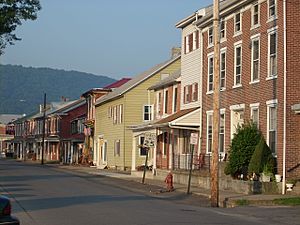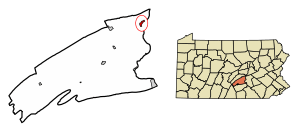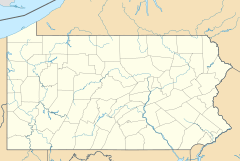Liverpool, Pennsylvania facts for kids
Quick facts for kids
Liverpool, Pennsylvania
|
|
|---|---|
|
Borough
|
|

Liverpool on a summer morning
|
|

Location of Liverpool in Perry County, Pennsylvania.
|
|
| Country | United States |
| State | Pennsylvania |
| County | Perry |
| Settled | 1808 |
| Incorporated | 1832 |
| Government | |
| • Type | Borough Council |
| Area | |
| • Total | 0.88 sq mi (2.28 km2) |
| • Land | 0.88 sq mi (2.28 km2) |
| • Water | 0.00 sq mi (0.00 km2) |
| Elevation
(center of borough)
|
420 ft (130 m) |
| Highest elevation
(western boundary of borough)
|
580 ft (180 m) |
| Lowest elevation
(Susquehanna River)
|
394 ft (120 m) |
| Population
(2020)
|
|
| • Total | 960 |
| • Density | 1,089.67/sq mi (420.95/km2) |
| Time zone | UTC-5 (Eastern (EST)) |
| • Summer (DST) | UTC-4 (EDT) |
| Zip Code |
17045
|
| Area code(s) | 717 |
| FIPS code | 42-43968 |
| Website | Historic Liverpool |
Liverpool is a small town, called a borough, in the northeastern part of Perry County, Pennsylvania, United States. It is part of the larger Harrisburg–Carlisle metropolitan statistical area. In 2020, about 959 people lived in Liverpool.
Contents
Where is Liverpool Located?
Liverpool is right next to the Susquehanna River. You can find it along U.S. Routes 11 and 15. It's also where Pennsylvania Route 17 ends.
The borough is about 20 miles (32 km) northwest of Harrisburg. It's also about 16 miles (26 km) southwest of Selinsgrove. Don't mix it up with Liverpool Township, which is a nearby area.
A Look at Liverpool's History
Liverpool was first settled in 1808 by the Stailey family. They came from Liverpool, England, and named the new place after their hometown. John Huggins surveyed the area, and Peter Williamson planned out the town that same year. It started as the land between what are now North Alley and Strawberry Street.
Becoming an Official Borough
On May 4, 1832, Liverpool officially became a borough. This means it became a self-governing town. It is one of nine boroughs in Perry County. The nearby area called Northern Liberties joined Liverpool when it became a borough.
Early Businesses and Growth
As more people moved to Liverpool, new businesses and services started. Thomas Gallagher was the first merchant, selling goods. John Huggins opened the first hotel.
Later, a foundry was built, which is a place where metal is melted and shaped. George Thorp started a distillery, and John Speece opened a tannery to make leather.
The first school in the community was a small log building, about 25 square feet.
Newspapers and Canals
In July 1821, John Huggins started the town's first newspaper, called the Mercury. This newspaper later joined with The Perry County Democrat.
Over the years, Liverpool also got a bank, a post office, and many new shops and churches.
By 1829, the Pennsylvania Canal system finished its Main Line Canal. This canal ran north, next to the Susquehanna River, for 39 miles. It connected places like Duncan's Island, New Buffalo, and Liverpool. Liverpool became an important center for the canal. This brought in people who built and operated canal boats. More hotels were built for visitors, and more homes were needed for workers.
In 1910, Liverpool had 596 people. By 1912, the schools in the borough had four teachers.
Liverpool's School District
| Historical population | |||
|---|---|---|---|
| Census | Pop. | %± | |
| 1840 | 451 | — | |
| 1850 | 606 | 34.4% | |
| 1860 | 662 | 9.2% | |
| 1870 | 823 | 24.3% | |
| 1880 | 838 | 1.8% | |
| 1890 | 821 | −2.0% | |
| 1900 | 653 | −20.5% | |
| 1910 | 596 | −8.7% | |
| 1920 | 586 | −1.7% | |
| 1930 | 586 | 0.0% | |
| 1940 | 607 | 3.6% | |
| 1950 | 654 | 7.7% | |
| 1960 | 894 | 36.7% | |
| 1970 | 847 | −5.3% | |
| 1980 | 809 | −4.5% | |
| 1990 | 934 | 15.5% | |
| 2000 | 876 | −6.2% | |
| 2010 | 955 | 9.0% | |
| 2020 | 959 | 0.4% | |
| 2021 (est.) | 963 | 0.8% | |
| Sources: | |||
Students in Liverpool go to schools in the Greenwood School District. The main campus for this district is in Millerstown, which is nearby.
Emergency Services in Liverpool
The Liverpool Volunteer Fire Company provides fire and emergency medical services for the town. They help keep everyone safe.
Who Lives in Liverpool?
The 2010 Census showed that 955 people lived in Liverpool.
- About 47.2% were male and 52.8% were female.
- Most residents (96.1%) were White.
- Smaller groups included 1% Asian, 0.6% Hispanic, 0.5% Black, and 0.2% Native American or Pacific Islander.
- About 0.2% were of other races or had two or more races.
In 2010, the average household income was $35,517.
See also
 In Spanish: Liverpool (Pensilvania) para niños
In Spanish: Liverpool (Pensilvania) para niños
 | Roy Wilkins |
 | John Lewis |
 | Linda Carol Brown |



